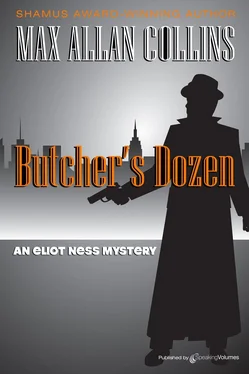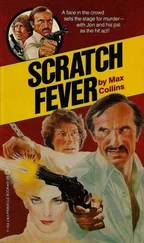Max Collins - Butcher's dozen
Здесь есть возможность читать онлайн «Max Collins - Butcher's dozen» весь текст электронной книги совершенно бесплатно (целиком полную версию без сокращений). В некоторых случаях можно слушать аудио, скачать через торрент в формате fb2 и присутствует краткое содержание. Жанр: Криминальный детектив, на английском языке. Описание произведения, (предисловие) а так же отзывы посетителей доступны на портале библиотеки ЛибКат.
- Название:Butcher's dozen
- Автор:
- Жанр:
- Год:неизвестен
- ISBN:нет данных
- Рейтинг книги:3 / 5. Голосов: 1
-
Избранное:Добавить в избранное
- Отзывы:
-
Ваша оценка:
- 60
- 1
- 2
- 3
- 4
- 5
Butcher's dozen: краткое содержание, описание и аннотация
Предлагаем к чтению аннотацию, описание, краткое содержание или предисловие (зависит от того, что написал сам автор книги «Butcher's dozen»). Если вы не нашли необходимую информацию о книге — напишите в комментариях, мы постараемся отыскать её.
Butcher's dozen — читать онлайн бесплатно полную книгу (весь текст) целиком
Ниже представлен текст книги, разбитый по страницам. Система сохранения места последней прочитанной страницы, позволяет с удобством читать онлайн бесплатно книгу «Butcher's dozen», без необходимости каждый раз заново искать на чём Вы остановились. Поставьте закладку, и сможете в любой момент перейти на страницу, на которой закончили чтение.
Интервал:
Закладка:
"I need move," he said. "That woman still in my room."
"What woman, Frankie?"
"Flo."
"Flo?"
"Woman who get chopped up."
Both of Dolezal's hands held the bottle.
"Oh. Who do you suppose did that?"
Dolezal's eyes flared and he gulped at the wine.
"I think maybe it was that wrestler," Ness said.
"Abe?" He snorted; suddenly the nervousness, the fear, was gone. "I am stronger than him."
"I bet you are," Ness said.
Actually, the man seemed small to Ness, albeit stocky.
"I am very strong. More I drink, more strong I am."
Ness said nothing: he was watching the two hands on the bottle.
"All his fault."
"Whose fault, Frankie?"
"Damn Hoover. That goddamn Herbert Hoover."
Somehow Ness felt the former president would have an alibi for the Butcher killings.
Suddenly Dolezal put a hand on Ness's shoulder; the grip was surprisingly strong. "You drink much, Harry?"
"Too much, sometimes, Frankie."
"You ever… wake up and not know what you do?"
"Sometimes. That happens to you, Frankie?"
"Sometimes," he said gravely. He gulped at the wine, wiped off his mouth with a grimy hand, which he'd removed from Ness's shoulder. Then both hands settled back on the bottle, caressingly. "Sometimes I no remember."
"Do you remember Flo, Frankie?"
"I remember Flo. Fat gal."
"Flo Polillo."
"Flo. Fat Flo."
"Did you drink with her?"
"Yes. Many nights. Flo could drink. Rose, too."
Rose!
"Rose, Frankie?"
"Rose."
Ness watched the two hands on the bottle.
"Was Rose fat like Flo, Frankie?"
"Rose was big, but not like Flo. Colored gal."
"I don't think I know her, Frankie."
"Not see her in long time."
"Rose, huh? Can't place her… what was her last name?"
"Wallace."
Ness watched the two hands.
"I move tomorrow. After I get my check."
"Move, Frankie?"
"Ghost in room. And they search houses. You not hear, Harry?"
"Who's searching houses?"
"Cops or somebody. Looking in everybody house. Looking in everybody business. I move tomorrow, Harry."
Dolezal rose, shakily, bracing himself on the wall. Ness watched the man's hands, felt very aware of the flight of steps at his back.
But Dolezal only shuffled down the corridor, weaving like the drunk he truly was, and entered suite 5.
Ness entered his own "suite" and gathered his things. He, like Frankie Dolezal, had decided to move.
Only he was moving tonight.
Right this minute.
CHAPTER 9
Detective Albert Curry, his face stubbly, his denim work shirt and brown cotton pants raggedy, stood in darkness on the East Fifty-fifth Street Bridge and stared into the ravine that was Kingsbury Run.
Curry knew that the Run had once been a beauty spot with gardens and stone quarries and lakes-his working-class parents, Cleveland natives, had told him so; now it was sumac bushes and trash heaps and a stench-emitting pool. But on this almost-cool, overcast Thursday night, just past nine, you could see nothing more than the yard lights of the railroads. The sickle blade of the moon, glowing behind dark clouds, was no help.
Somewhere down there was the shantytown where he would become a resident. Somewhere down there, possibly, was the so-called Mad Butcher of Kingsbury Run.
Curry walked back to his Ford sedan and began to drive, navigating deserted side streets whose occasional streetlamps were feeble against the night, matches lit in a vast dark room. He felt strangely unrefreshed from his all-afternoon sleep: the three days and nights he'd spent at the shantytown at Canal and Commerce had taken their toll. His apartment had seemed unreal to him, like something in a dream; the reality of the packing-crate world he'd been inhabiting lingered like a bad taste.
He felt hungover from the strange cocktail of boredom and fear: the boredom of long hot days mingled with the fear of long hot nights in the crowded cluster of shacks on a rubbish-strewn hillside just blocks from Cleveland's downtown.
He had met many homeless men, any of whom might be the Butcher, none of whom struck him as such. Some of them were down-and-out and others seemed taken by wanderlust. They were as young as eighteen and as old as seventy; there were a few families, women putting the wash out on makeshift lines, a few raggedy kids wandering about, though mostly the community had seemed male.
What was troubling Curry was something vague, something he couldn't put his finger on. Perhaps it was the lack of structure, which meant so much to a career cop like Curry. Meals seemed to happen now and then, time blurred meaninglessly, men came and went, without a hello, without a good-bye.
Or maybe it was that these men seemed to live in a different world, with its own ways, its own values. They were cleaner than he had imagined, many of them; there was less drinking; some of the men read papers, books, magazines-there was political talk, Red-tinged mostly, predictably. Bums were chased out when they appeared- shantytown welcomed hobos and tramps only. The hobos, he had soon discovered, were migratory workers; his cover story, of coming up from Florida having picked oranges, put him safely in that category. Tramps, it seemed, were migrants who occasionally worked-odd jobs and such- but did a lot of back-door begging at homes and restaurants. Bums were skid-row refuse to be disdained.
That was why the hobos and tramps were cleaner, better kept, than he'd imagined they'd be: you had to be clean to get that job; you had to be clean to mooch that meal.
He wheeled the sedan gently off Bessemer Avenue onto a dirt road, which wound behind the Ferro Foundry to a dump. He stopped beside a delapidated, deserted brick building, its windows dark and many of them broken-out. He locked and left the car here and began to walk, bedroll on his back. In front of him were flatcars; to the right, a sheer drop-off into that dark, stagnant pool, gurgling down there like a drowning man.
He found the least-steep place and made his way down to the banks of the foul pool where one victims parts (some of them) had turned up; the moon and lights from a nearby viaduct were silver on the water's greasy surface. The pool was separated from the railroad tracks by a narrow strip, thick with sumac bushes, though a footpath of sorts was there. He took it.
Branches reached out for him as he felt his way along. A breeze rustled the bushes, which he began to imagine hid the Butcher himself, and why not? This was the Run, after all, the Headhunter's stomping grounds…
Curry reached into his pocket and gripped his jack-knife, the blade of which was open. He'd rather have been holding a flashlight, though-it would've made his journey simpler-but he didn't figure a hobo would carry one of those. Did the Butcher?
He could hear his own heart beating as he pushed branches out of the way, but after a time the scrub trees and brush let up somewhat, and he found himself in a clearing. And in the clearing, draped in shadows and the cool gray-blue of the cloud-filtered moonlight, was the shantytown.
The shantytown at Commerce and Canal had been crowded in upon itself; this one, though, with perhaps a few shanties less than the thirty-some at the other settlement, seemed larger. It sprawled across the level ground of the gully and began crawling up the embankment. Shacks and lean-tos, sagging like the backs of old men, had some breathing room here-though why anyone would want to breathe this sewer-tainted air, Curry couldn't fathom. Corrugated metal, broken boards, packing crates, provided walls for the hovels; tar paper on roofs was kept in place with stones or chunks of cement. The ground was carpeted with straw and chicken feathers and charred tin cans and discarded rubbing-alcohol bottles.
Читать дальшеИнтервал:
Закладка:
Похожие книги на «Butcher's dozen»
Представляем Вашему вниманию похожие книги на «Butcher's dozen» списком для выбора. Мы отобрали схожую по названию и смыслу литературу в надежде предоставить читателям больше вариантов отыскать новые, интересные, ещё непрочитанные произведения.
Обсуждение, отзывы о книге «Butcher's dozen» и просто собственные мнения читателей. Оставьте ваши комментарии, напишите, что Вы думаете о произведении, его смысле или главных героях. Укажите что конкретно понравилось, а что нет, и почему Вы так считаете.












